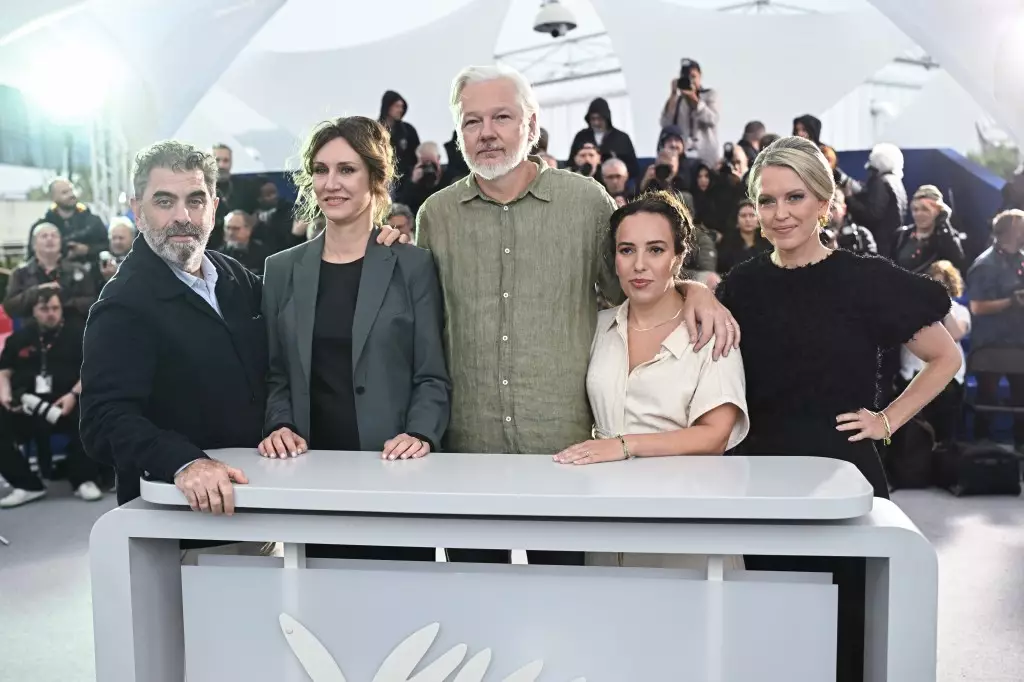It’s hard to fathom that in an age where information is king, whistleblower platforms like Wikileaks have gone silent for over five years. This quietude undoubtedly reflects a win for those governments that thrive on secrecy, yet it is a disheartening loss for proponents of transparency and democracy. The filmmaker Eugene Jarecki, renowned for his incisive political documentaries, recently unveiled his latest work, *The Six Billion Dollar Man*, at the prestigious Cannes Film Festival. In this insightful exposé, Jarecki lays bare the extensive and systematic assault waged against Julian Assange — a man who is often misconceived as a mere hacker, but is in fact a truth-teller relentlessly pursued by multiple U.S. administrations.
Jarecki’s assertion that the U.S. government has expended a staggering $6 billion to undermine Assange demonstrates the lengths to which the establishment will go to silence dissenting voices. This figure is not merely a product of legal fees but represents a coordinated campaign involving international financial pressure and political maneuvering — particularly during the Trump administration. The revelation that American officials reportedly dangled financial aid to Ecuador in exchange for Assange’s extradition exposes a disturbing dimension of power politics, where economic leverage often supersedes democratic ideals.
The Ethical Dilemma of Political Manipulation
At what point does the struggle for national security overstep into the realm of ethical malpractice? Jarecki’s documentary does not shy away from addressing uncomfortable truths about the U.S.’s tendency to prioritize its interests over democratic norms in other nations. By resorting to financial coercion, the U.S. has turned its back on the very principles it claims to uphold — an irony that should leave anyone with a sense of justice feeling deeply disturbed.
Furthermore, watching Assange’s journey from the protective walls of the Ecuadorian Embassy to a U.K. prison clouded by extradition battles stirs a sense of alarm. How easily can a whistleblower, who merely sought to expose corruption and wrongdoing, become a target of state-sponsored persecution? The disturbing precedent this sets — that whistleblowers may face annihilation instead of protection — casts a shadow over the future of press freedom and democracy.
A Cautionary Tale for Modern Democracy
*The Six Billion Dollar Man* presents Assange not just as a singular case but as a cautionary tale for the modern democratic society. Through the lens of his struggle, the film prompts vital questions about the role of journalism, transparency, and the power vested in governmental control. For Jarecki, Assange’s survival against “the world’s greatest superpower” offers a stark lesson about the consequences faced by those who dare to expose the truth.
It is also noteworthy to consider the film’s reception at Cannes, where it won a Special Jury Prize. Yet, even in the triumph of artistic merit, there lurks a tragic irony: the film currently lacks a distribution deal in the U.S. This void in domestic representation paints a picture of a society reluctant to engage with uncomfortable narratives — perhaps due to the fear of retribution or simply an unwillingness to face an unsettling reality.
The Dissonance Between Art and Industry
While Jarecki’s anticipation for a better reception among American distributors is tinged with sarcasm, it underscores the ongoing dissonance between art and commerce in America. A profound social commentary encapsulated in a documentary may hold immense value, but all too often that value is sidelined in favor of safer, palatable narratives. The consequences of sidestepping difficult conversations allow the erosion of democratic principles to persist unchallenged.
As Assange takes his bow in the grand theater of global politics — now returned to Australia, having navigated the treacherous waters of legal entanglement and international diplomacy — the unresolved questions remain. How do we reconcile our collective desire for transparency with a state apparatus dedicated to maintaining secrecy? The answers may not be simple, but it’s a discourse that must continue if we are to safeguard the ideals upon which open societies are founded.


Leave a Reply